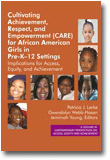
Cultivating Achievement, Respect, and Empowerment (CARE) for African American Girls in PreK‐12 Settings
Implications for Access, Equity and Achievement
Edited by:
Dr. Patricia J. Larke, Texas A&M University
Dr. Gwendolyn Webb-Hasan, Texas A&M University
Dr. Jemimah L. Young, University of North Texas
A volume in the series: Contemporary Perspectives on Access, Equity, and Achievement. Editor(s): Chance W. Lewis, University of North Carolina at Charlotte.
Published 2016
chapters discuss issues impacting the education of African American girls and many of challenges that they encounter during their schooling experiences. The chapters were written by 24 authors including a school superintendent, university administrator and professors, classroom teacher, mother and a 10th grade African American student.
The 20 chapters of the book are organized into four sections. Section one introduces the book and provides critical perspectives. Section Two focuses on Curriculum and instruction. Section Three shares information from significant stakeholders while the last section includes other schooling experiences and ends with a powerful poem by a tenth grade African American girl, entitled “Proud.” The forward of the book, written by a Japanese American scholar, Valerie Pang, denotes the urgency of the book noting that the book “warms the heart.” The book ends with an epilogue, written by an African American scholar, Tyrone Howard, who has a vested interest in African American males. He shares commanding interest in this scholarship, because what happens to African American females, impacts African American males and the entire African American community.
CONTENTS
Dedication. Acknowledgements. Forward, Valerie Pang. SECTION I: INTRODUCTION AND PERSPECTIVES. Hey GOOGLE, Include Us...African American Girls, Patricia J. Larke, Gwendolyn Webb‐Hasan and Jemimah Young. African American Girls in the 21st Century: My Issues Are Not My Mother’s Issues, Evangeline M. Castle. A Baba’s Story: My Purpose as a Father to an African American Girl, Ronald S. Rochon. Culturally Sensitive Investigation (CSI): State of Education for African American Girls, PreK‐12 Settings, Patricia J. Larke, Gwendolyn Webb‐Hasan and Jemimah Young. SECTION II: SCHOOLING EXPERIENCES FROM CONTENT TO INSTRUCTION. The Younger the Better: Culturally Responsive Teaching for Lil Sistas, Geneva Gay. Vervistic Instruction as a Vehicle to Mathematics Competency for African American Girls, Jamaal Young. African American Girl’s Social Studies Achievement: Gazing Beyond the Gap, Jemimah Young. Promoting Assertiveness and “Somebodyness”: Theatre Strategies and Resources to Enhance Black Girls Achievement in K‐12 Settings, Sandra Mayo. Technology and African American Girls: We Can Be Techies, Too, Trina Davis and Nicholas Ortiz. Making It Over: African American Girls Making Space In Unfamiliar Suburbs, Jemimah Young and Kira Rideaux. SECTION III: SIGNFICANT STAKEHOLDERS EDUCATING AFRICAN AMERICAN GIRLS. White Teachers and African American Girls: We Can Make A Difference, Alicia Ann Kerr. Educating African American Girls: The Role of the Superintendent, Teresa L. Pope. Parental Involvement and African American Girls: The Role of Mothers, Angela Abney. The Invisible Ones in School: Immigrant Girls of African Descent, Kesha Bryan. Not Every Child Is Fine… Not Every Smile Is Real: Educating African American Girls With an Incarcerated Parent, Altricia Larke‐McCowan and Aaron Larke, Sr. SECTION IV: OTHER SCHOOLING AND EDUCATIONAL ISSUES. African American Girls and the Kaleidoscope of Identity: Reflections of Contextual Strategies to Promote Positive Identity Development, Ayana Allen. If I am not My Hair, Who Am I: African American Girls and Their Hair, Gwendolyn Webb‐Hasan and Chanda Elbert. The Impact of Sport Participation on African American Girls’ Health, Akilah R. Carter‐Francique. Community Service Learning’s Role in the Education of African American Girls, Vanessa Liles, Donna Druery, Yvonne Matthews, Patricia J. Larke and Gwendolyn Webb‐Hasan. “Proud”, A’Nia L. DuRant. Epilogue, Tyrone Howard. Contributors.
-
Paperback9781681235066
Web price: $45.04 (Reg. 52.99)
-
Hardcover9781681235073
Web price: $80.74 (Reg. 94.99)
- eBook9781681235080

- EDU034000 - EDUCATION: EDUCATIONAL POLICY & REFORM: General
- EDU054000 - EDUCATION: Urban
- SOC056000 - SOCIAL SCIENCE: Black Studies (Global)
-
 Advancing Inclusive Excellence in Higher Education
Practical Approaches to Promoting Diversity, Equity, Inclusion, and Belonging
Advancing Inclusive Excellence in Higher Education
Practical Approaches to Promoting Diversity, Equity, Inclusion, and Belonging
-
 Developing Culturally Responsive Learning Environments in Postsecondary Education
Developing Culturally Responsive Learning Environments in Postsecondary Education
-
 Economic, Political and Legal Solutions to Critical Issues in Urban Education and Implications for Teacher Preparation
Economic, Political and Legal Solutions to Critical Issues in Urban Education and Implications for Teacher Preparation
-
 Imagining the Future
Historically Black Colleges and Universities - A Matter of Survival
Imagining the Future
Historically Black Colleges and Universities - A Matter of Survival
-
 Post-Secondary Planning for All
Approaches to College and Career Readiness Counseling for Special Populations
Post-Secondary Planning for All
Approaches to College and Career Readiness Counseling for Special Populations
-
 Preparing to Lead
Narratives of Aspiring School Leaders in a "Post"-COVID World
Preparing to Lead
Narratives of Aspiring School Leaders in a "Post"-COVID World
-
 Unveiling the Cloak of Invisibility
Why Black Males are Absent in STEM Disciplines
Unveiling the Cloak of Invisibility
Why Black Males are Absent in STEM Disciplines

